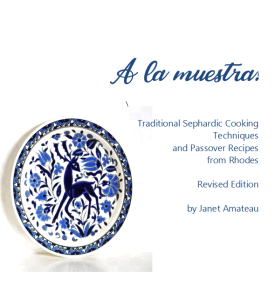Contrasts of flavor, color and texture are an integral part of Sephardic gastronomic tradition – of others, too, of course, though by no means all (where I live, the food is mostly mushy, bland and tending toward weirdness), and to varying degrees among them. One of our signatures is a sour sauce, agrestada, or agristada (from the Spanish root word agrio: sour).
Agrestada is an egg and lemon mixture that’s either blended right into a hot dish as a finishing touch, exactly as the Greeks do avgolemono (which means egg-lemon), or cooked separately to yield a luscious lemon mayonnaise. The light note – and that’s all it is supposed to be – of sourness, of piquancy, wakes up the taste buds with a pleasant, lemony tingle, not a shock. It’s intended for specific dishes, to bring out the flavors it accompanies, not to compete with them, to create a ‘whole’ experience; a gastronomic yin and yang. Which means the lemon flavor should be easy to discern, but it shouldn’t twist up the mouth like a fistful of Sweet Tarts, or whack you – or the food it’s eaten with – senseless. Continue reading


